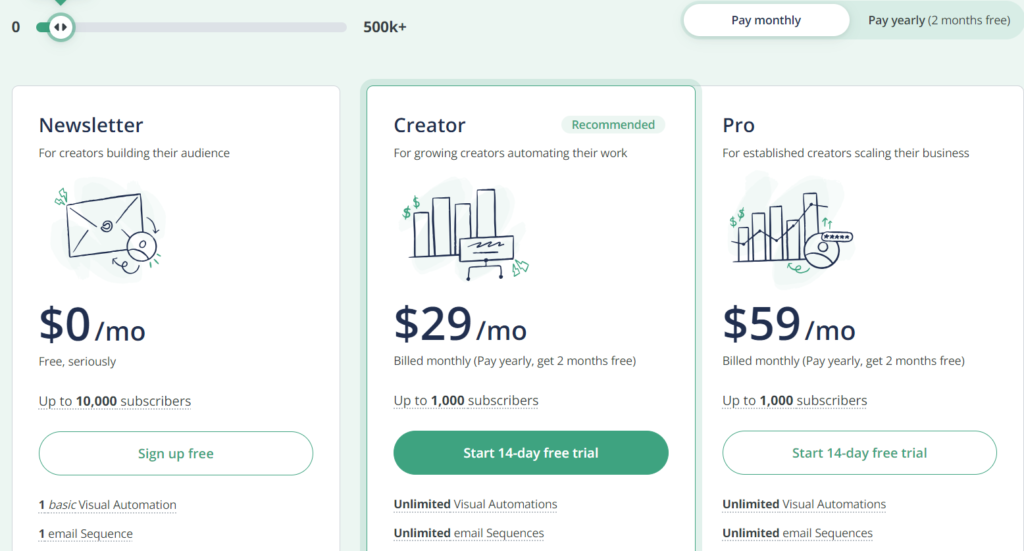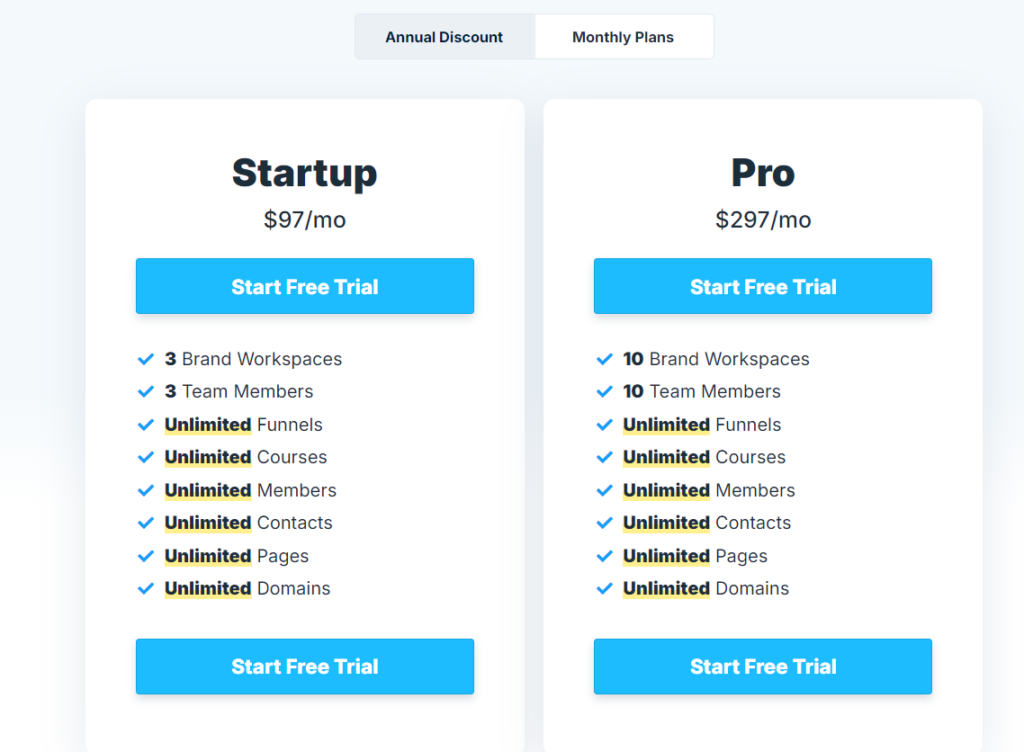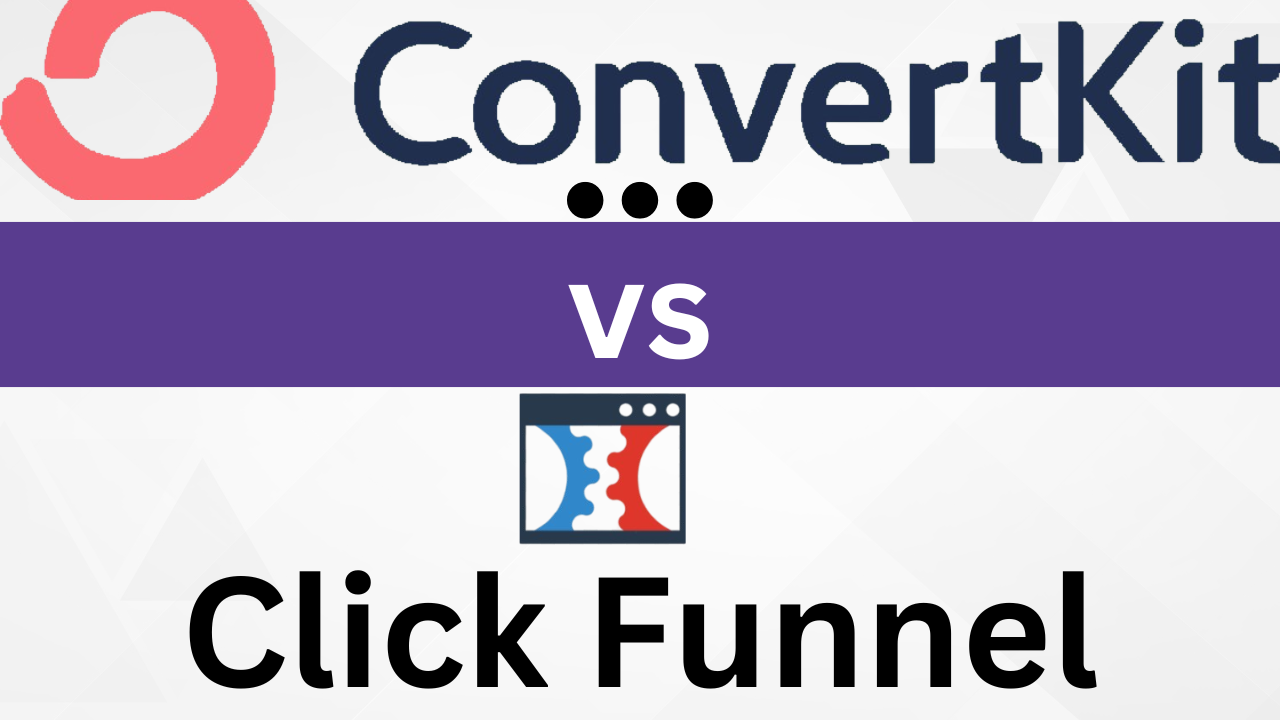Introduction
When it comes to choosing the right marketing platform for your business, the decision often comes down to ConvertKit vs Clickfunnel. Both are powerful tools designed to enhance your online marketing efforts, but each has its unique strengths and features. In this comprehensive comparison, we’ll explore what ConvertKit and Clickfunnel have to offer, helping you determine which platform is the best fit for your specific needs. Whether you’re focused on email marketing, sales funnel optimization, or both, this guide will provide the insights you need to make an informed choice.
Overview of ConvertKit
Brief History and Background
ConvertKit was founded in 2013 by Nathan Barry, an entrepreneur and blogger who recognized the need for a simple yet powerful email marketing tool tailored for creators. Since its inception, ConvertKit has grown rapidly, becoming a favorite among bloggers, content creators, and small businesses due to its user-friendly interface and robust automation capabilities.
Key Features
ConvertKit offers a range of features designed to simplify email marketing and enhance audience engagement:
- User-Friendly Interface: ConvertKit’s intuitive design makes it easy for users to navigate and set up email campaigns without technical expertise.
- Advanced Email Automation: The platform allows users to create automated email sequences based on subscriber actions, ensuring timely and relevant communication.
- Subscriber Tagging and Segmentation: ConvertKit enables users to tag and segment subscribers based on their behavior and interests, allowing for highly targeted email campaigns.
- Customizable Sign-Up Forms: Users can create and customize sign-up forms to capture leads and grow their email list.
- Comprehensive Analytics: ConvertKit provides detailed analytics to track email performance and subscriber engagement, helping users optimize their campaigns.
Pros and Cons
Pros:
- Ease of Use: ConvertKit is designed with simplicity in mind, making it accessible for users of all skill levels.
- Powerful Automation: The platform’s automation features are robust and highly customizable, allowing for sophisticated email marketing strategies.
- Excellent Customer Support: ConvertKit is known for its responsive and helpful customer support team.
Cons:
- Limited Design Customization: While ConvertKit’s email templates are functional, they offer fewer design customization options compared to some competitors.
- Higher Pricing: ConvertKit can be more expensive than other email marketing tools, especially for users with larger subscriber lists.
Pricing of ConvertKit
ConvertKit offers a tiered pricing model designed to accommodate businesses of all sizes, from small bloggers to large enterprises. The pricing structure is based on the number of subscribers, ensuring that users only pay for what they need. Here’s a detailed breakdown of ConvertKit’s pricing plans:

Free Plan
- Cost: $0/month
- Subscribers: Up to 300
- Features: Includes core email marketing features, customizable sign-up forms, and unlimited landing pages. This plan is ideal for beginners who are just starting to build their email list.
Creator Plan
- Cost: Starting at $29/month
- Subscribers: Up to 1,000
- Features: Includes advanced email automation, subscriber tagging, and segmentation, integrations with third-party tools, and premium support. This plan is suitable for growing businesses that need more robust email marketing capabilities.
Creator Pro Plan
- Cost: Starting at $59/month
- Subscribers: Up to 1,000
- Features: Includes everything in the Creator Plan plus advanced reporting, priority support, Facebook custom audiences integration, and subscriber scoring. This plan is designed for established businesses that require more detailed insights and enhanced support.
Scalable Pricing
- As your subscriber count increases, ConvertKit’s pricing adjusts accordingly. For example:
- 3,000 subscribers: $49/month (Creator Plan), $79/month (Creator Pro Plan)
- 10,000 subscribers: $119/month (Creator Plan), $149/month (Creator Pro Plan)
- For subscriber lists exceeding 100,000, custom pricing and enterprise solutions are available.
Pricing Table
| Plan | Cost | Subscribers | Key Features |
|---|---|---|---|
| Free Plan | $0/month | Up to 300 | Core email marketing features, customizable sign-up forms, unlimited landing pages |
| Creator Plan | Starting at $29/month | Up to 1,000 | Advanced email automation, subscriber tagging and segmentation, integrations with third-party tools, premium support |
| Creator Pro Plan | Starting at $59/month | Up to 1,000 | All features in Creator Plan, advanced reporting, priority support, Facebook custom audiences integration, subscriber scoring |
| 3,000 Subscribers | $49/month | Up to 3,000 | All features in respective plan (Creator or Creator Pro) |
| 10,000 Subscribers | $119/month | Up to 10,000 | All features in respective plan (Creator or Creator Pro) |
| Enterprise | Custom Pricing | Over 100,000 | Custom pricing and solutions, tailored features, dedicated support |
Additional Costs
- Migration Services: ConvertKit offers free migration services for users switching from another email marketing platform, making it easier to transition without additional costs.
- Add-Ons: Some advanced features and integrations may incur additional charges depending on the specific needs of your business.
Pros and Cons of ConvertKit’s Pricing
Pros:
- Flexible Plans: ConvertKit’s tiered pricing ensures that businesses only pay for what they need, making it a cost-effective solution.
- Feature-Rich Free Plan: The free plan offers essential features, allowing new users to get started without any financial commitment.
- Scalable Pricing: As your business grows, ConvertKit’s pricing scales with you, offering higher-tier plans with more advanced features.
Cons:
- Higher Costs for Larger Lists: As your subscriber list grows, the monthly costs can become relatively high compared to some other email marketing platforms.
- Limited Features on Free Plan: While the free plan is feature-rich, it lacks some advanced automation and reporting capabilities available in the paid plans.
Overview of Clickfunnel
Brief History and Background
Clickfunnel, founded in 2014 by Russell Brunson, has quickly become a leading platform for creating sales funnels and landing pages. Designed to help businesses maximize their conversion rates, Clickfunnel provides a comprehensive suite of tools that cater to marketers, entrepreneurs, and companies focused on driving online sales.
Key Features
Clickfunnel offers a robust set of features that streamline the process of building and optimizing sales funnels:
- Drag-and-Drop Funnel Builder: Clickfunnel’s intuitive drag-and-drop editor allows users to create and customize sales funnels without any coding knowledge.
- A/B Testing Capabilities: Users can run A/B tests on their funnels to determine which variations perform best, optimizing their conversion rates.
- Membership Site Creation: Clickfunnel enables users to create membership sites, offering a platform for selling online courses and exclusive content.
- Email and Facebook Marketing Automation: The platform integrates with popular email marketing and Facebook advertising tools, allowing users to automate their marketing efforts.
- Integrations with Payment Gateways: Clickfunnel supports various payment gateways, making it easy to process transactions and manage sales.
Pros and Cons
Pros:
- Comprehensive Funnel-Building Features: Clickfunnel provides all the tools needed to create and optimize sales funnels, from landing pages to checkout processes.
- Strong Integration Options: The platform integrates with various marketing tools, payment gateways, and third-party services, enhancing its functionality.
- Robust Training Resources: Clickfunnel offers extensive training and support resources, including tutorials, webinars, and a community forum.
Cons:
- Steeper Learning Curve: Due to its comprehensive features, Clickfunnel can be more complex to master, especially for beginners.
- Higher Cost: Clickfunnel’s pricing is higher compared to some other sales funnel and landing page builders, which may be a consideration for small businesses.
Pricing of Clickfunnel
Clickfunnel offers a tiered pricing structure that caters to various business needs, from small startups to large enterprises. The pricing plans are designed to provide flexibility and access to a comprehensive set of features for building and optimizing sales funnels. Here’s a detailed look at Clickfunnel’s pricing:

Pricing Plans
Basic Plan
- Cost: $97/month
- Features:
- 20 funnels
- 100 pages
- 20,000 visitors per month
- 3 custom domains
- Access to funnel templates
- Email integrations
- A/B split testing
- Membership site capabilities
- Basic support
Platinum Plan
- Cost: $297/month
- Features:
- Unlimited funnels
- Unlimited pages
- Unlimited visitors per month
- 9 custom domains
- All features of the Basic Plan
- Priority support
- Additional training resources
- Follow-up funnels (advanced email marketing automation)
- Access to FunnelFlix (extensive training and educational resources)
Two Comma Club Plan
- Cost: Custom pricing
- Features:
- Tailored for high-volume users
- Unlimited funnels, pages, visitors, and custom domains
- All features of the Platinum Plan
- Dedicated account management
- VIP phone support
- Advanced analytics and reporting
- Additional customization options
Pricing Table
| Plan | Cost | Features |
|---|---|---|
| Basic Plan | $97/month | 20 funnels, 100 pages, 20,000 visitors/month, 3 custom domains, funnel templates, email integrations, A/B split testing, membership site capabilities, basic support |
| Platinum Plan | $297/month | Unlimited funnels, pages, and visitors/month, 9 custom domains, priority support, advanced training resources, follow-up funnels (email automation), FunnelFlix access |
| Two Comma Club Plan | Custom Pricing | Unlimited funnels, pages, visitors, and custom domains, dedicated account management, VIP phone support, advanced analytics and reporting, additional customization options |
Additional Costs
- Add-Ons: Some advanced features, such as Actionetics (email automation) and Backpack (affiliate management), may be available as add-ons or included in higher-tier plans.
- Transaction Fees: Clickfunnel does not charge additional transaction fees, but standard fees from payment gateways (e.g., Stripe, PayPal) apply.
Pros and Cons of Clickfunnel’s Pricing
Pros:
- Comprehensive Features: Even the Basic Plan includes a wide range of features to build effective sales funnels.
- Scalable Options: As your business grows, Clickfunnel’s plans can scale with you, offering more advanced features and support.
- Training Resources: Clickfunnel provides extensive training materials through FunnelFlix, helping users maximize the platform’s potential.
Cons:
- Higher Initial Cost: Clickfunnel’s pricing is higher compared to some competitors, which may be a barrier for small businesses or startups.
- Complexity for Beginners: The extensive feature set can be overwhelming for new users, requiring a learning curve to fully utilize the platform.
ConvertKit vs Clickfunnel: Key Differences
When evaluating ConvertKit vs Clickfunnel, it’s essential to understand their core differences to determine which platform aligns best with your business needs. Both tools offer unique features and functionalities, catering to different aspects of online marketing. Here’s a detailed comparison of the key differences between ConvertKit and Clickfunnel:
Primary Focus and Use Cases
ConvertKit:
- Primary Focus: Email marketing automation.
- Ideal For: Bloggers, content creators, and small businesses focused on building and nurturing email lists.
- Core Strength: ConvertKit excels in creating and managing email campaigns, with robust automation features that allow for personalized and targeted communication.
Clickfunnel:
- Primary Focus: Sales funnel creation and optimization.
- Ideal For: Marketers, entrepreneurs, and businesses focused on driving online sales and conversions.
- Core Strength: Clickfunnel is designed to build comprehensive sales funnels, from landing pages to checkout processes, with tools to optimize each stage for higher conversion rates.
Feature Comparison
ConvertKit Key Features:
- Email Automation: Advanced workflows and automation rules for personalized email sequences.
- Subscriber Segmentation: Tagging and segmentation to target specific audience groups effectively.
- Landing Pages: Customizable landing pages to capture leads and grow email lists.
- Integrations: Seamless integration with various third-party tools like eCommerce platforms, CRM systems, and more.
Clickfunnel Key Features:
- Sales Funnel Builder: Drag-and-drop editor for creating customized sales funnels.
- A/B Testing: Built-in A/B testing capabilities to optimize funnel performance.
- Membership Sites: Tools to create and manage membership sites for delivering exclusive content.
- Payment Integration: Supports multiple payment gateways for seamless transaction processing.
- Follow-Up Funnels: Advanced email and SMS marketing automation tied directly to funnel stages.
Ease of Use
ConvertKit:
- User Interface: Clean and intuitive interface designed for ease of use, even for beginners.
- Learning Curve: Minimal, with user-friendly features and straightforward navigation.
- Support Resources: Comprehensive support resources, including tutorials, webinars, and a community forum.
Clickfunnel:
- User Interface: More complex due to the extensive range of features and customization options.
- Learning Curve: Steeper, requiring time to master all the tools and functionalities.
- Support Resources: Extensive training materials through FunnelFlix, as well as tutorials and community support.
Pricing and Value
ConvertKit:
- Pricing: More affordable, with a free plan available for beginners and scalable options based on subscriber count.
- Value: Offers excellent value for businesses focused primarily on email marketing, with a wide range of features at a lower cost.
Clickfunnel:
- Pricing: Higher initial cost, with advanced features available at higher-tier plans.
- Value: Justifies the higher cost for businesses that need comprehensive sales funnel capabilities and are focused on maximizing conversions.
Flexibility and Customization
ConvertKit:
- Flexibility: Highly flexible for email marketing but limited in design customization compared to more comprehensive platforms.
- Customization: Adequate for email templates and landing pages but not as extensive as Clickfunnel.
Clickfunnel:
- Flexibility: Extremely flexible for creating detailed and customized sales funnels.
- Customization: Extensive, with a wide range of templates and design options to tailor funnels to specific business needs.
Summarry
In the battle of ConvertKit vs Clickfunnel, the choice boils down to your specific business goals and needs. ConvertKit is the go-to platform for email marketing, providing robust automation and subscriber management features at a competitive price. On the other hand, Clickfunnel is the ideal choice for businesses focused on building and optimizing sales funnels, offering a comprehensive set of tools to drive online sales and conversions.
Who Should Use ConvertKit?
ConvertKit is an email marketing platform designed to meet the needs of specific user groups who require robust automation and easy-to-use features. Here’s a detailed look at who should use ConvertKit and why it might be the perfect fit for your business:
Bloggers and Content Creators
Why It’s Ideal:
- Email Automation: ConvertKit’s powerful automation features allow bloggers and content creators to set up personalized email sequences that engage their audience and drive traffic to their content.
- Subscriber Segmentation: Tagging and segmentation features enable users to target specific groups of subscribers with tailored content, enhancing engagement and conversion rates.
- Ease of Use: The intuitive interface makes it easy to create, manage, and analyze email campaigns without needing extensive technical knowledge.
Examples:
- Personal bloggers sharing lifestyle tips.
- Professional writers promoting their latest articles or books.
- YouTubers and podcasters updating their audience on new content.
Small Businesses and Startups
Why It’s Ideal:
- Cost-Effective: ConvertKit offers a free plan and affordable pricing tiers that scale with your subscriber count, making it budget-friendly for small businesses and startups.
- Lead Generation: Customizable landing pages and sign-up forms help capture leads and grow your email list, which is essential for business growth.
- Integrations: Seamless integration with eCommerce platforms, CRM systems, and other tools supports business operations and marketing efforts.
Examples:
- Local shops promoting sales and new arrivals.
- Startups launching new products or services.
- E-commerce stores running email marketing campaigns.
Online Course Creators
Why It’s Ideal:
- Membership Sites: ConvertKit’s capabilities extend to managing membership sites, allowing course creators to deliver content and manage subscriptions efficiently.
- Automated Sequences: Automated email sequences can guide students through the course, providing a structured learning experience.
- Subscriber Engagement: Tagging and segmentation can be used to send targeted emails based on student progress and engagement levels.
Examples:
- Educators offering online courses in various subjects.
- Fitness instructors providing workout programs and tips.
- Professional coaches offering skill development courses.
Freelancers and Consultants
Why It’s Ideal:
- Client Management: ConvertKit helps freelancers and consultants manage their client communications effectively through personalized email campaigns.
- Marketing Automation: Automated workflows save time by sending the right message to the right client at the right time.
- Professional Appearance: High-quality email templates and landing pages enhance professionalism and client trust.
Examples:
- Marketing consultants sending newsletters and updates.
- Graphic designers promoting their portfolio and services.
- Freelance writers managing client communications and project updates.
Summarry
ConvertKit is a versatile email marketing tool that caters to bloggers, small businesses, online course creators, and freelancers. Its user-friendly interface, powerful automation features, and cost-effective pricing make it an excellent choice for anyone looking to grow and engage their audience through email marketing.
Who Should Use Clickfunnel?
Clickfunnel is a powerful tool designed to help businesses build effective sales funnels and drive conversions. Here’s a detailed look at who should use Clickfunnel and why it might be the perfect fit for your business:
Digital Marketers
Why It’s Ideal:
- Comprehensive Funnel Building: Clickfunnel provides all the tools needed to create detailed sales funnels, from landing pages to checkout processes.
- A/B Testing: Marketers can optimize funnel performance through built-in A/B testing capabilities.
- Email and SMS Marketing: Follow-up funnels allow for advanced email and SMS marketing automation, enhancing customer engagement and retention.
Examples:
- Digital marketing agencies managing client campaigns.
- Affiliate marketers promoting products and services.
- Social media marketers driving traffic to sales pages.
Entrepreneurs and Small Business Owners
Why It’s Ideal:
- All-in-One Platform: Clickfunnel combines website building, landing page creation, and marketing automation in one platform.
- Lead Generation: Tools for creating high-converting landing pages and lead capture forms are essential for growing a customer base.
- Sales Optimization: Features like upsells, downsells, and order bumps help maximize revenue per customer.
Examples:
- E-commerce store owners optimizing their sales process.
- Local businesses promoting special offers and services.
- Startups launching new products and services.
Online Course Creators and Coaches
Why It’s Ideal:
- Membership Sites: Clickfunnel allows for the creation and management of membership sites to deliver course content.
- Webinar Funnels: Tools for setting up webinar registration and follow-up sequences help in engaging potential students.
- Sales Pages: Professional sales pages designed to convert visitors into students or clients.
Examples:
- Online educators offering paid courses.
- Fitness coaches providing workout programs and consultations.
- Business coaches selling coaching packages and services.
Consultants and Service Providers
Why It’s Ideal:
- Client Acquisition: Clickfunnel helps consultants and service providers create funnels that attract and convert leads into clients.
- Booking Funnels: Tools for setting up consultation booking funnels streamline the client acquisition process.
- Marketing Automation: Follow-up funnels ensure that potential clients receive timely and relevant information.
Examples:
- Business consultants managing client acquisition and follow-ups.
- Health and wellness coaches offering personalized consultations.
- Financial advisors promoting their services and booking appointments.
E-commerce Businesses
Why It’s Ideal:
- Sales Funnel Optimization: Clickfunnel’s tools help e-commerce businesses create optimized sales funnels to increase conversions.
- Order Management: Features like one-click upsells and order bumps increase average order value.
- Customer Retention: Follow-up funnels and email sequences help retain customers and encourage repeat purchases.
Examples:
- Online stores selling physical products.
- Dropshipping businesses managing multiple product lines.
- Subscription box services optimizing their sign-up processes.
Summarry
Clickfunnel is a versatile platform that caters to digital marketers, entrepreneurs, online course creators, consultants, and e-commerce businesses. Its comprehensive set of tools for building and optimizing sales funnels makes it an ideal choice for anyone focused on driving conversions and maximizing revenue.
Conclusion
In the comparison of ConvertKit vs Clickfunnel, each platform offers distinct advantages tailored to different marketing needs. Understanding these differences is crucial in making the right choice for your business.
ConvertKit
is ideal for those focused on email marketing, particularly bloggers, content creators, small businesses, and online course creators. Its user-friendly interface, powerful automation features, and cost-effective pricing make it an excellent tool for nurturing and engaging an audience through personalized email campaigns.
Clickfunnel
excels in creating and optimizing sales funnels, making it perfect for digital marketers, entrepreneurs, e-commerce businesses, and service providers. With its comprehensive suite of tools for building detailed sales funnels, conducting A/B testing, and managing follow-up sequences, Clickfunnel is designed to drive conversions and maximize revenue.
Making the Right Choice
- For sophisticated email automation and audience engagement: Choose ConvertKit.
- For comprehensive sales funnel optimization and increased conversions: Choose Clickfunnel.
Both platforms have proven their effectiveness in helping businesses achieve their marketing goals. Your decision should be guided by your specific needs, marketing strategies, and budget. Whether you aim to build a strong email list or create high-converting sales funnels, understanding the strengths of ConvertKit and Clickfunnel will enable you to make an informed choice that supports your business growth.
Final Thoughts
There is no one-size-fits-all answer in the debate between ConvertKit vs Clickfunnel. By evaluating your business requirements and understanding the unique features each platform offers, you can select the tool that best aligns with your marketing objectives. Both ConvertKit and Clickfunnel have the potential to enhance your marketing efforts and drive your business forward, so choose the one that best meets your needs and start reaping the benefits.




